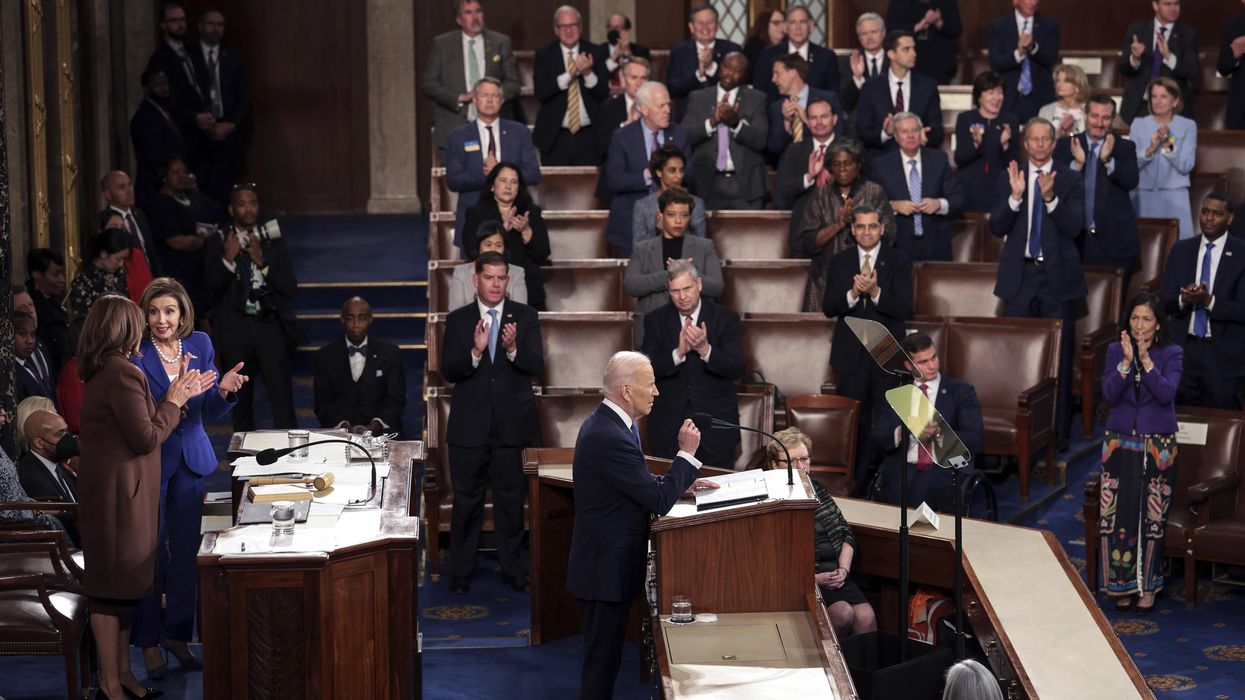President Biden gave Ukraine top billing and said fighting inflation is the “top priority” during his State of the Union address Tuesday. But he also spoke at length about building a unity agenda and — very briefly — called for passage of election reform legislation.
Three years ago, House Democrats first introduced the For the People Act, giving the sweeping election overhaul legislation the symbolic designation “HR 1” — the first bill offered by the newly empowered Democratic majority. Three years and multiple versions later, the legislation remains mired in a partisan dispute, with Republicans in near unanimous opposition to one of the Democrats’ lead issues.
Biden called for passage of the latest version of the bill, as well as other election reforms, during his speech, but spent just 35 seconds discussing those priorities.
“The most fundamental right in America is the right to vote — and to have it counted. And, look, it’s under assault,” he said, about 45 minutes into his hour-long address. “In state after state, new laws have been passed, not only to suppress the vote — we’ve been there before — but to subvert the entire election. We cannot let this happen.”
“Tonight I call on the Senate to pass the Freedom to Vote Act, pass the John Lewis Voting Rights Act. And while you’re at it, pass the Disclose Act so Americans know who is funding our elections.”
The Freedom to Vote Act is the successor to the For the People Act. It was negotiated by Sen. Joe Manchin, a moderate Democrat from West Virginia, in hopes of winning enough Republican backers to overcome a filibuster. But that bill and the John Lewis Voting Rights Advancement Act, which would restore elements of the Voting Rights Act struck down by the Supreme Court, remain blocked.
The other bill Biden mentioned is a favorite of those who want more transparency in campaign financing. If enacted, it would require groups like super PACs and “ dark money ” organizations to disclose many of their donors.
Biden spent far more time talking about opportunities for bipartisanship. (The words “bipartisan” and “unity” appear a combined seven times in the official transcript.)
Shortly after concluding his section on Ukraine and fighting authoritarianism, Biden thanked members of both parties for their work to pass the massive bipartisan infrastructure bill last year, and asked Congress to follow it up by enacting what he called the Bipartisan Innovation Act. He was likely referring to the America COMPETES Act, a measure designed to make the United States more competitive with China. While 19 Republicans voted for the Senate version of the bill, only one backed the House version. Lawmakers must work out differences between the chambers.
The president returned to the theme later, noting he signed 80 bipartisan bills into law in 2021 and calling for “a unity agenda for the nation” with four primary themes:
- Ending the opioid epidemic.
- Tackling mental health, particularly among children.
- Supporting veterans.
- Bringing an end to cancer.
At one point, while speaking about the Covid-19 pandemic, Biden noted that Americans have been deeply divided on the issue, generally along party lines, and called for a moment “to reset.”
“Let’s stop looking at Covid-19 as a partisan dividing line and see it for what it is: a God-awful disease. Let’s stop seeing each other as enemies, and start seeing each other for who we really are: fellow Americans,” he said. “We can’t change how divided we’ve been. But we can change how we move forward — on Covid-19 and other issues we must face together.”
There were even moments when Biden appeared to be directly appealing to Republicans and moderate Democrats at the expense of his party’s base, such as when he spoke against progressives’ “defund the police” movement.
"We should all agree: The answer is not to defund the police. The answer is to fund the police,” he said. “Fund them with the resources and training they need to protect our communities."
Throughout the speech, Republicans seemed willing to join Biden’s call for unity. Traditionally, there’s a clear line between the parties, as the president’s party stands and applauds throughout while the opposing party sits on their collective hands. But this year, both parties appeared to offer enthusiastic support far more than in the recent past.
As he neared the final lines of his first State of the Union address, Biden spoke optimistically of Americans’ ability to defend the nation’s shared values:
“We will meet the test. To protect freedom and liberty, to expand fairness and opportunity. We will save democracy.”




















Trump & Hegseth gave Mark Kelly a huge 2028 gift